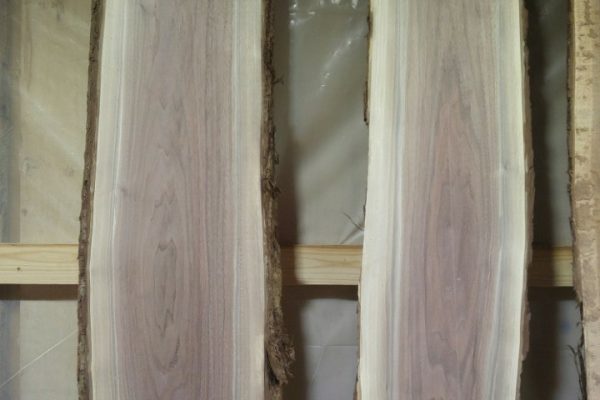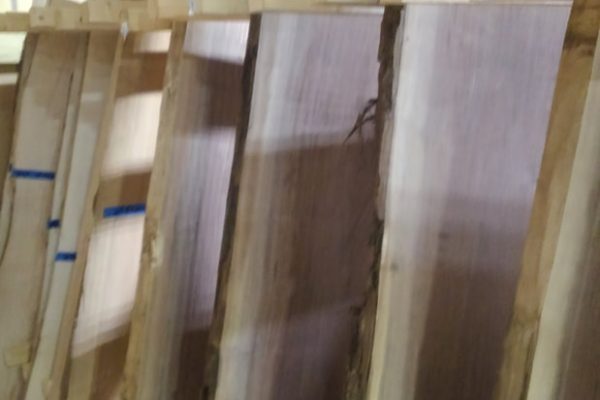All of our walnut is at least 90% clear and most of our boards are 100% clear. This allows you to have the least amount of waste when using one of our boards.
Peruvian 4/4 (1″): This walnut is usually darker in color than the Black Walnut and the FAS Walnut. Most boards are from 5″ to 8″ wide
Cost: $12.30 a board foot
(over 200 bf in stock)
FAS grade 4/4 (1″): This is an official lumber grade from the National Hardwood Lumber Association (NHLA). FAS means First and Seconds. This walnut has been steamed to blend the dark heartwood with the light sapwood. As mentioned above, these boards are at least 90% clear.
Cost: $11.20 a board foot
(over 200 bf in stock)
Many of our customers tell us that our Prime Walnut is their favorite walnut to use. It is all heartwood since we remove the sapwood. In addition, these boards are clear so that is very little waste.
Prime (Clear) 4/4 (1″): from $11.70
We have new fantastic 4/4 stock available. The boards are absolutely beautiful!!
(over 200 bf in stock)
6/4 (1.5″): Prime (Clear) $12.70 a board foot
(more than 200 bd ft in stockl)
8/4 (2″): Prime (Clear) $13.70 a board foot )
(over 200 bd ft in stock)
(> 8″ is + 1.00, > 12″ is + 1.00
8/4 (2″) Black Walnut Live Edge Slabs
( 6 slabs in stock) More are ready to be flattened


1. Black Walnut Grows in the Central and Eastern USBlack walnut is primarily grown in the Central and Eastern parts of the United States. It grows best in the Midwest, in well-drained bottoms, and in coves.
Its native range includes parts of:
It also appears in other states with favorable climates and conditions.
Its growing season ranges from 140 days in the northern regions to 280 days in western Florida. Black walnut’s optimum annual temperature is 55°F (13° C).
2. Its Latin Name Is Juglans NigraBlack walnut’s Latin name is Juglans Nigra. It’s a part of the walnut family, Juglandaceae.
These trees can reach between 65 and 120 feet (20 and 30 meters) tall or higher. Their trunk is between 2-3 feet (60 to 90 cm) in diameter.
3. Black Walnut Trees Don’t Need WeedkillerBlack walnut trees secrete juglone in their fruit, leaves, and branches, and it can be excreted from its roots and into the soil. Juglone can kill herbaceous plants, which means it can act as its own weed killer.
This serves as a benefit to the tree as it limits competition for nutrients and water.
4. It’s Prized by WoodworkersBlack walnut is one of the most prized native hardwoods, especially in the furniture industry. Black walnut’s close-grained wood is easy to work with and is often sought after by cabinet makers.
It has a gorgeous color and is extremely durable, making it ideal for solid furniture, cabinets, gunstocks, and more.
Unfortunately, it’s in such high demand that walnut rustlers have taken to stealing trees from homeowners.
5. Its Nuts Are Used in Baked Goods, Ink, and MedicineBlack walnuts are one of the most common wild nuts, second only to acorns. When properly processed, they taste similar to other walnuts but also have an earthy taste. There is also a slight bitter hint as well.
To eat them, it’s best to remove the outer husk as soon as possible, or a bitter flavor can leech inside the nuts.
Black walnuts are a bit messy to prepare, but they’re often used in baked goods. Common recipes include cakes, pies, and cookies.
One reason black walnuts are so messy to prepare is that the outer husk contains a sap that can stain clothing and skin. It contains juglone and tannins that can be used as a dye.
While the nut is often used in food, the shell/hull and the leaf can be used in medicine.
6. It’s Decay-Resistant and DurableEarly settlers discovered that the rich-brown heartwood of black walnut trees was particularly resistant to decay.
It’s also a very durable type of wood, strong and shock-resistant, which makes it ideal for gunstocks. It was often used for gunstocks during the Civil War, World War I, and World War II.
These days, the primary use for black walnut lumber is furniture manufacturing, paneling, cabinets, flooring, musical instruments, sculpture, and for use in the veneer industry.
More Information About Black Walnut LumberNow that you know some fun and interesting facts about black walnut trees, you might be wondering if it’s the right choice for your project. Here’s more general information about black walnut.
Janka Hardness: 1,010 lbf (4,490 N). The Janka test measures the ability of a type of wood to resist wear and denting, as well as determine how difficult a species is mill, saw, and nail.
Grain/Texture: Black walnut’s grain is often straight. However, it can also be irregular. Black walnut has a medium grain and texture with a moderate luster.
Workability: Black walnut is usually very easy to work with, which is another reason it’s so sought-after. This is due to the grain being straight and regular. This type of wood also glues, finishes, and stains well, making it an ideal choice for a variety of different woodworking and renovation projects.
Allergies: Black walnut is a type of sensitizer, which means the more that someone is exposed to sawdust and particles, the more sensitive they become. However, severe reactions are uncommon, and the most common reactions are mild skin and eye irritation.
Knots: Black walnuts are large trees, but their canopy starts lower down. Since this type of tree has a lot of branches, the wood can have a lot of knots. To avoid knots, look for lumber that’s at least 80% clear.
At GPS Hardwoods, all of our black walnut lumber is at least 90% clear, with most of our boards being 100% clear. This means you’ll have less waste to deal with, regardless of what you’re working on.
Appearance: Heartwood can vary in appearance from a lighter brown to a darker chocolate color. The color can also sometimes have a purple, red, or gray cast to it.
Cost: Black walnut is considered a premium domestic hardwood. Our high-quality black walnut lumber costs between $10 a board foot to $13 a board foot.
Finding Hardwood Lumber Suppliers Near MeNow that you know more about black walnut, you can experience the benefits of this beautiful type of wood for yourself. If you’re looking for “hardwood lumber suppliers near me,” look no further than GPS Hardwoods. We serve Winston Salem, Greensboro, High Point, Raleigh, Charlotte, and surrounding areas.
Walnut is typically difficult to dry, but we use a specialized vacuum kiln specifically to dry our black walnut lumber.
To inquire about our walnut planks for sale, or if you have questions about black walnut lumber, or you need to know how to calculate how much you might need, send us a message.
Lorem Ipsum is simply dummy text of the printing and typesetting industry.
